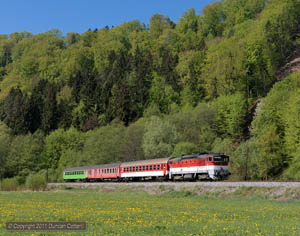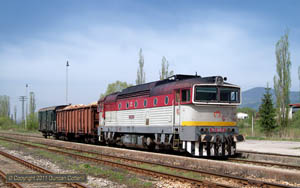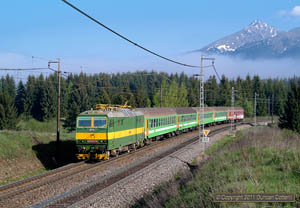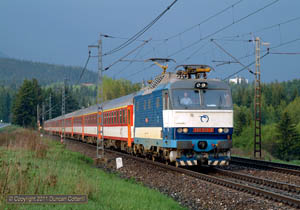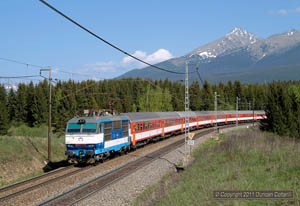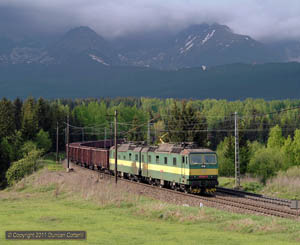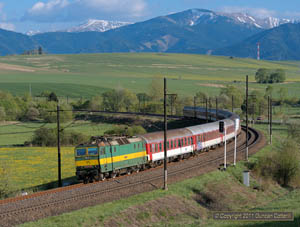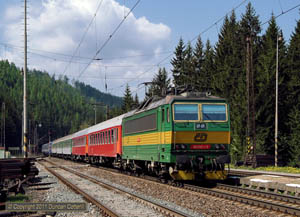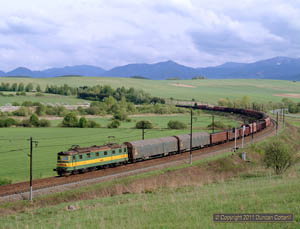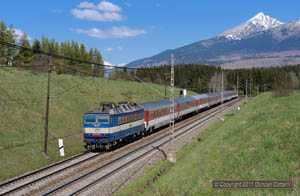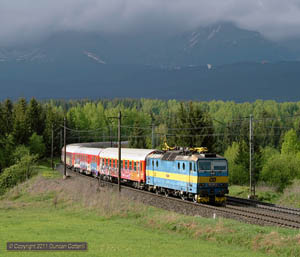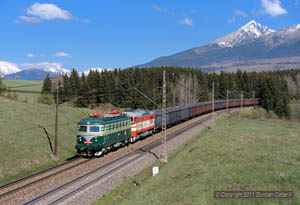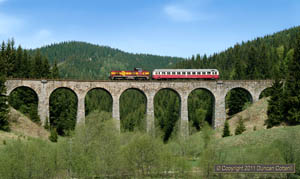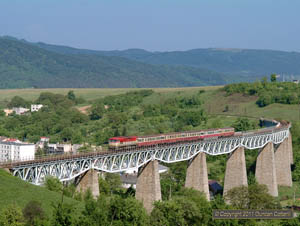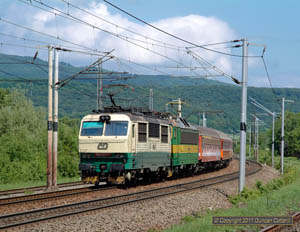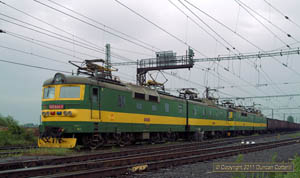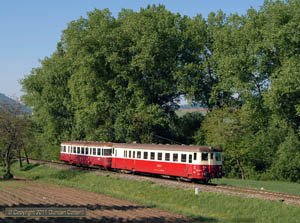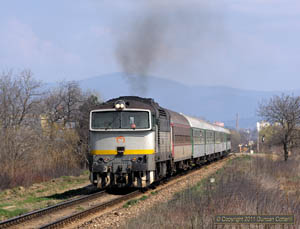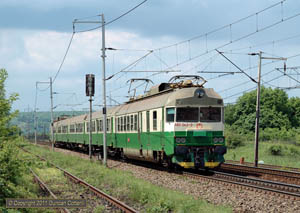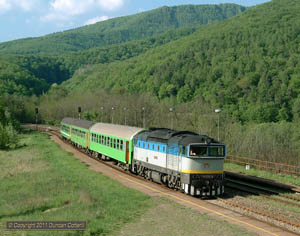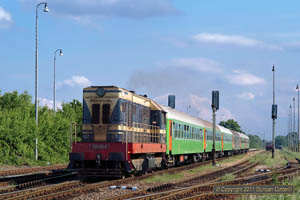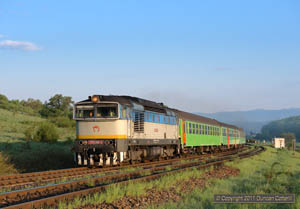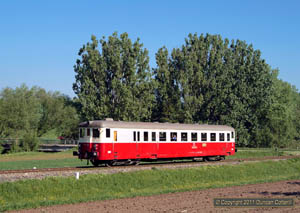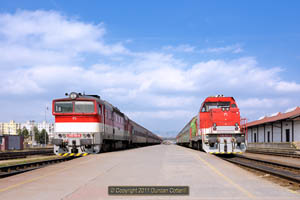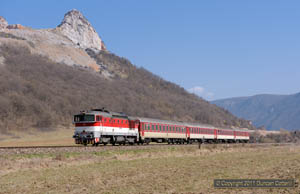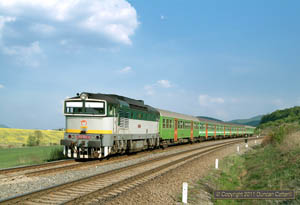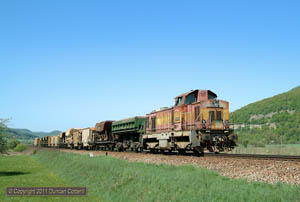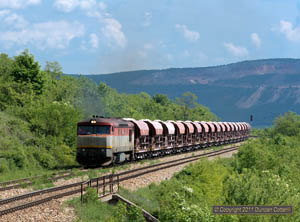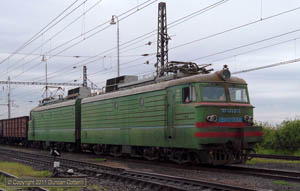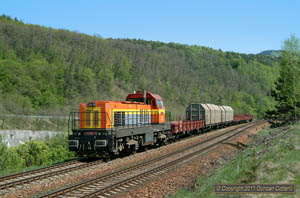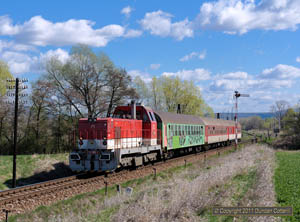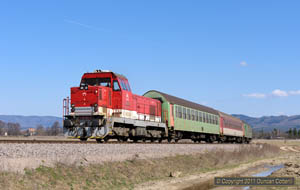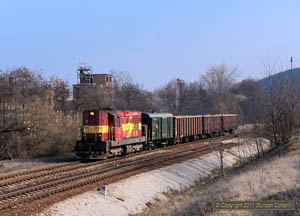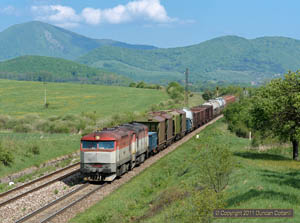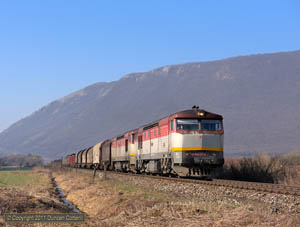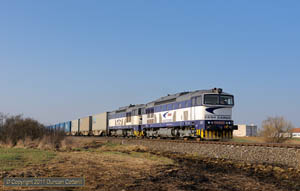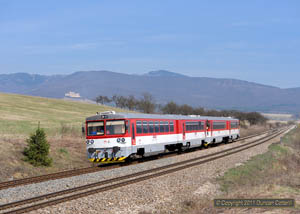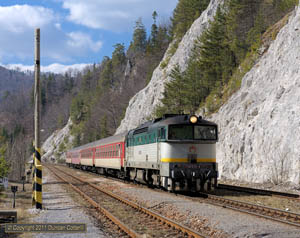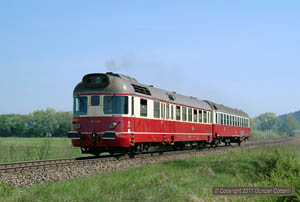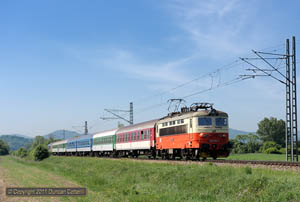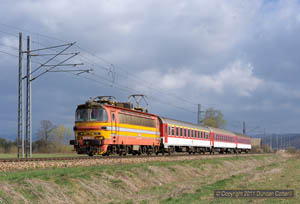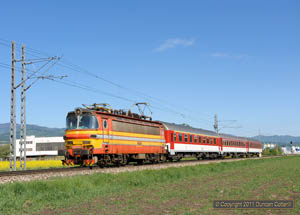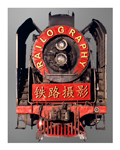172-173 Banska Bystrica - Margecany
18 photos
updated : 2020-12-20
The long secondary route from Banska Bystrica to Margecany is superbly scenic and runs from east to west through the mountainous heart of the country. The passenger service is sparse, particularly at the east end, but there is some loco haulage. Freight traffic is minimal and limited to pick-up workings.
Class 753
5 photos
updated : 2020-12-20
The Class 753 1780hp Bo-Bo diesel-electric was a development of the Class 751 and fitted with a train heating boiler.. A total of 408 were built in 1968-77. After the end of steam heat they were used on freight until ZSSK Cargo's last locos were withdrawn in the early years of the 21st Century.
180 Zilina - Kosice
33 photos
updated : 2020-12-20
Slovakia’s principal west - east main line climbs to a summit 900m above sea level at Strba, in the shadow of the High Tatra mountains. The line is double track and electrified, with heavy passenger and freight traffic. Many types of electric loco can be seen, including the unique Class 131s and visitors from CD.
Class 350
3 photos
updated : 2020-12-20
Skoda built 20 class 350 dual system Bo-Bo electrics between 1974 and 1976. They were CSD's first 160km/h locos, intended for Praha - Bratislava services. All 20 went to Slovakia at partition, where they work between the capital and Kosice, as well as international services to Praha and Budapest.
Multi System Electrics
11 photos
updated : 2020-12-20
Czechoslovakia electrified much of its network at 3000V DC before switching to 25kV AC in the late 1960s. Some routes involve both voltages and dual system designs were introduced from the 1970s. More recently standard multi-system designs from Siemens and Bombardier have also been used.
Class 131
9 photos
updated : 2020-12-20
The 100 Class 131 3000V DC electrics were built in 1980-82, designed to drag heavy freights over the steeply graded Zilina - Kosice main line, where they can still be found. Each loco has a single cab and they invariably run as Bo-Bo+Bo-Bo pairs. The electrical equipment is based on the Class 130, with resistive control.
DC Electrics
29 photos
updated : 2020-12-20
CSD electrified several major routes at 3000V DC from the 1950s onwards, before switching to 25kV AC as the preferred system in the late 1960s. Most DC electrics date from the 1970s or later but a few early examples still see some use. Czech DC electrics can also be seen on Slovak rails.
Class 163
8 photos
updated : 2020-12-20
Class 163 is the 3000V DC only version of the dual-system Class 363 mixed traffic Bo-Bo, built in 1984-92. Slovakia inherited 37 at partition but 26 were rebuilt as dual voltage Class 361. The remaining Slovak 163s work passenger trains on DC lines in the north, where Czech examples can also be seen.
Class 183
7 photos
updated : 2020-12-20
Class 183 are 3000V DC Co-Co freight electrics, built in 1971 and similar to the earlier Class 182. All 43 went to Slovakia at partition and around half are still in service with ZSSK Cargo. They can be found working freight on the DC lines in the north of the country, often banking trains over the summit at Strba.
Class 362
7 photos
updated : 2020-12-20
The Class 362 is the express passenger version of the Class 363 dual system Bo-Bo electric. Only one Class 362 was built new, in 1990, the rest have been created since 1999 by fitting class 363s with 140km/h bogies. ZSSK now has around 24 Class 362s, mainly used on services that cross the AC/DC divide.
Class 162
1 photo
updated : 2020-12-20
The Class 162 is a 3000V DC Bo-Bo electric loco introduced in 1991 and geared for 140km/h running. Otherwise they're the same as the 120km/h Class 163s. ZSSK only has 8 Class 162s, which can be found working fast and local passenger trains on the DC lines in the north of the country.
Class 363
1 photo
updated : 2020-12-20
The Class 363 25kV AC/3000V DC Bo-Bo was the first of a large group of electric locos. The class went into series production in 1984, designed for mixed-traffic use, particularly on routes that involve both electrical systems. Several have been converted to Class 362 by fitting bogies geared for 140km/h.
Class 140
1 photo
updated : 2020-12-20
The Class 140 3000V DC Bo-Bo was the first electric design built in quantity for CSD with 100 produced in 1953-58. The 140 was a mixed traffic loco based on contemporary Swiss practice and survived in Slovakia until the early 2000s. Several locos are still used by independent operators.
Class 731
1 photo
updated : 2020-12-20
Class 731 Bo-Bo diesel-electrics are low-powered locos intended for shunting and light freight work, built in 1988-1992. They can be considered an improved version of the earlier Class 730 and, like their predecessors, are fairly camera shy. ZSSK inherited 11 examples, all of which are now with ZSSK Cargo.
193 Presov - Straszke
11 photos
updated : 2020-12-20
This rural secondary line forms the main part of the secondary route from Presov to Humenne and had a good loco hauled passenger service in 2003. Despite an influx of 4-wheel railbuses, there were still a few loco hauled trains in 2011. The line runs through attractive countryside with some impressive viaducts.
190 Kosice - Cierna nT & SRT
8 photos
updated : 2020-12-20
Two 3000V DC electrified lines run in parallel towards the Ukrainian border east of Kosice. The double track standard gauge line to Cierna nad Tisou carries passenger and freight traffic while the 5' gauge SRT is freight only and runs to a second border crossing at Matovce, north of Cierna.
Class 125
2 photos
updated : 2020-12-20
Class 125 are twin unit Bo-Bo 3000V DC electric locos based on the Class 123 design but mounted on 5' gauge bogies for use on the SRT between Matovce, on the Ukrainian border, and Kosice steelworks. Each loco has a single cab and they work in pairs. ZSSK Cargo still operate 18 double units.
194 Kapusany - Bardejov
4 photos
updated : 2020-12-20
The (Presov) - Kapusany - Bardejov line was one of the last Slovak lines to be worked by class 830 railcars but a number of loco hauled services, worked by the elusive class 752 diesels, were also seen during a 2003 visit. The line is a delightful rural backwater, running through attractive countryside.
191 Banovce n/O - Humenne
4 photos
updated : 2020-12-20
The line from Banovce nad Ondavou north to Humenne is one of the least photogenic in Slovakia but has one of the country’s most intense diesel hauled passenger services. Class 754s work most local services on the line as well as the few fast trains. Freight traffic is minimal.
Class 460
1 photo
updated : 2020-12-20
The first class 460 5-car 3000V DC EMU was built in 1971 with 42 more following in 1974-78. Many went to CD at partition but ZSSK had around 15 units which were concentrated around Kosice in the east of the country. Most of the ZSSK units have been withdrawn but a few remain on local services around Kosice.
EMUs
1 photo
updated : 2020-12-20
Until the early years of the 21st Century the only EMUs in Slovakia were used on suburban duties around Bratislava and Kosice. Since then, more modern units have been introduced for local and regional services, replacing most of the older units and also some loco hauled services.
Class 150
1 photo
updated : 2020-12-20
The Class 150 3000V DC Bo-Bo electric was introduced in 1978 as a DC only version of the Class 350 for express passenger work. The whole class of 27 went to CD at partition, with half being upgraded to Class 151. The remaining Class 150s were regular visitors to eastern Slovakia on trains from Czechia.
160 Zvolen - Jesenske
35 photos
updated : 2020-12-20
The Zvolen - Jesenske line is the western section of a long diesel worked secondary route that runs from west to east across southern Slovakia. Until recently most passenger trains were loco hauled by Class 750 or 754 diesels and there were a few freights as well. The line is quite scenic in places.
Class 721
1 photo
updated : 2020-12-20
Class 721 consisted of 283 end-cab 740hp Bo-Bo diesel electrics built 1962-72 as a more robust version of the Class 720. ZSSK inherited around 100 locos with 86 going to ZSSK Cargo, all of which are now withdrawn. The remaining 21 went to ZSSK and most are still in service, used for shunting.
Class 750
40 photos
updated : 2020-12-20
Class 750 consisted of Class 753 Bo-Bo diesels fitted with an ETH generator between 1991 and 1995. A total of 163 were converted, with ZSSK getting 46 after the breakup of Czechoslovakia. They continued to work passenger trains into the 2010s when many were rebuilt again to become Class 757s.
Class 830
2 photos
updated : 2020-12-20
A total of 238 Class 830 diesel-electric railcars were built from 1949 to 1960 for main line services. They were later displaced to less important duties but some survived in Slovakia until 2006, working local passenger services on secondary routes and branch lines in the north of the country.
Diesels
155 photos
updated : 2020-12-20
Widespead dieselisation took place in Czechoslovakia in the 1970s, generally using diesel-electric locos of domestic manufacture. Most of the diesels active in Slovakia today date from that period, although many have since been rebuilt with modern electronics and more efficient engines.
Loco Hauled Passengers
131 photos
updated : 2020-12-20
Most long distance passengers are still loco hauled and it's also possible to find locos on local services on the electrified network, although the number of EMUs is increasing. Diesel haulage is largely restricted to a few routes with heavy traffic levels or working through coaches on long distance routes.
Class 754
56 photos
updated : 2020-12-20
Class 754 was the final development of the 'Brejlovic' Bo-Bo design, built new with electric train heating. A total of 86 entered service with CSD and ZSSK received 26 in 1993. They are still active, working many of the remaining loco hauled passenger services on non-electrified lines.
Class 730
1 photo
updated : 2020-12-20
Class 730 Bo-Bo diesel-electrics were fairly elusive in ZSSK service, being mostly limited to shunting. Only 59 were built in 1978-89 and many went into industrial service. They were intended to replace the ageing Class 720 and 721 but never really caught on. All of ZSSK's locos have been withdrawn or sold.
Freight
67 photos
updated : 2020-12-20
Freight traffic dropped dramatically after the fall of the iron curtain and the deregulation of road transport in the early 1990s. There are still significant levels of freight on several corridors but, away from the electrified main lines, it can be sparse and diesel worked freights are relatively hard to find.
Class VL11 (UZ)
1 photo
updated : 2020-12-20
Class VL11 is a 2, 3 or 4 unit, 5' gauge, 3000V DC electric freight loco built at Tbilisi from 1975 for Soviet Railways, with numerous variations to the design over the years. Ukrainian VL11s work a few km into Slovakia from Uzhhorod to Matovce, where loads are trans-shipped or handed over to Slovakian traction.
Class 770, 771, 773
6 photos
updated : 2020-12-20
Classes 770 and 771 were CSD's version of the ChME3 Co-Co diesel-electric built in quantity for the USSR. ZSSK got about 90 in 1993 and around 35 are still in service with ZSSK Cargo. Ten locos were modernised at Zvolen in the 1990s, becoming Class 773, now used on the 5' gauge lines in the east.
140 Nove Zamky - Prievidza
8 photos
updated : 2020-12-20
The Nove Zamky - Prievidza line is a long single-track secondary line that is served by a mixture of loco hauled passengers and railbuses. For most of its length, the line runs through flat, farming country but north of Partizanske it gets close to the hills for the last few km, through Novaky to Prievidza.
Class 736
13 photos
updated : 2020-12-20
Class 736 was formed by rebuilding unreliable, inefficient Class 735 centre-cab Bo-Bo diesel-electrics with two Caterpillar engines, the main one rated at 1340hp, the auxiliary one at 170hp. There are 24 Class 736.0 in service with ZSSK Cargo and 5 Class 736.1, fitted with ETH and in service with ZSSK.
Class 742, 746
6 photos
updated : 2020-12-20
The Class 742 1180hp Bo-Bo diesel-electric was developed from the Class 740 to meet CSD's requirements. Almost 500 were built in 1977-86 but ZSSK only got around 90 in 1993. Zvolen rebuilt 17 around 2010 along similar lines to the Class 736 rebuilds. Both classes can be found on shunting and freight duties.
160 Jesenske - Kosice
36 photos
updated : 2020-12-20
The Jesenske - Kosice main line is the eastern part of the cross-country route from Zvolen. It has a few Class 754 hauled fast passengers and even fewer locals, all 4-wheel railbuses. However, freight traffic is heavy for a diesel worked route and most of the freights were worked by Class 751s, often in pairs.
Class 751, 752
28 photos
updated : 2020-12-20
The Class 751 1480hp Bo-Bo diesel-electric was introduced in 1964. Class 752 was the same design but without train heating. ZSSK Cargo operates both classes on freights on non-electrified parts of the Slovak network, although they have lost many of their duties to modernised classes.
Class 756, 757
2 photos
updated : 2020-12-20
ZSSK Cargo operates 10 Class 756, a modernised Class 753, essentially equivalent to the Czech Class 753.7. ZSSK's 25 Class 757 are similar rebuilds of Class 750s and are fitted with ETH. Both classes were produced by ZOS Zvolen, the 756s in 2008-2010 and the 757s in 2010-2015.
Class 810, 811, 812, 813
3 photos
updated : 2020-12-20
Classes 811, 812 and 813 are all rebuilds of the once ubiquitous Class 810 4-wheel railbuses or their Class 010 or 011 trailers. Class 810 is now extinct in Slovakia but over 100 of the rebuilds continue in service with ZSSK on rural and branch line services. A few 811s have been sold to Czech operators.
170 Zvolen - Vrutky
47 photos
updated : 2020-12-20
The route from Vrutky to Zvolen via Banska Bystrica is an important north - south link and is quite busy with freight and passenger traffic. South of Banska is electrified but the best section is to the north where the line climbs through the mountains to a tunnel under the Maly Sturec Pass.
Class 850, 851
2 photos
updated : 2020-12-20
The first two class 850 diesel-hydraulic railcars were built in 1962 but it was 1967 before another 50 were built. The similar Class 851 followed, with 37 built in 1968-69. They were intended for express passenger work but were relegated to more menial duties later. All ZSSK's had been withdrawn by 2007.
Diesel Motor Coaches
5 photos
updated : 2020-12-20
Instead of DMUs, CSD traditionally built diesel motor coaches to work fast and semi-fast services on unelectrified main and secondary lines. They were designed to haul a number of trailers but had to run round their trains like a loco at termini. All ZSSK's motor coaches had been withdrawn by 2007.
Class 242
2 photos
updated : 2020-12-20
ZSSK has no Class 242s but CD's locos are regular visitors to Slovakia. The 242s are technically similar to the Class 240s but differ in having a conventional steel body. In total 86 were built between 1976 and 1981 and the class is currently based at Brno and Plzen depots for working passenger services.
AC Electrics
5 photos
updated : 2020-12-20
Several of Slovakia's major routes are electrified at 25kV AC, including the line from Brno, through Bratislava towards Budapest. ZSSK and ZSSK Cargo employ a number of different classes of AC electric, many of them dating from the 1960s or 1970s but including some modern locos as well.
Class 240
3 photos
updated : 2020-12-20
The 145 Class 240s built in 1968-70 were CSD's second class of AC electric, following the similar Class 230. They got the nickname 'Laminatka' due to the use of fibreglass in their construction. ZSSK inherited around 100 locos, about half of which are still in use on passengers and freight in the south and west.
Slovakia is a small central European country with an interesting rail system. There are significant differences to Czechia in some areas such as liveries and the rates at which some of the older classes have been withdrawn. One thing that the two countries do share is a very attractive landscape.




 options
options hide options panel
hide options panel